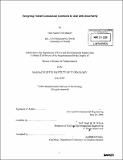Designing transit concession contracts to deal with uncertainty
Author(s)
Blakey, Tara Naomi Chin
DownloadFull printable version (16.51Mb)
Other Contributors
Massachusetts Institute of Technology. Dept. of Civil and Environmental Engineering.
Advisor
Nigel H. M. Wilson.
Terms of use
Metadata
Show full item recordAbstract
This thesis proposes a performance regime structure for public transit concession contracts, designed so incentives to the concessionaire can be effective given significant uncertainty about the future operating conditions. This is intended to aid agencies in designing regimes that will encourage continually improving performance through the use of relevant and adaptive incentives. The proposed incentives are adjusted annually based on actual circumstances. An adaptive regime can also allow the incentives to be more cost and resource efficient and is especially well-suited to so-called "gross-cost" contracts when the public agency retains the fare revenue and absorbs the revenue risk for the services. The motivation for this research is the anticipated transfer of the oversight responsibilities for the Silverlink Metro regional rail services, in outer London, from the UK Department for Transport to Transport for London. This new service will undergo substantial infrastructure and service upgrades in the next several years and an innovative operating contract is required to maintain and improve service levels during this transitional period. The Proposed performance regime is composed of two major components: 1. A "bundled" set of specific performance measures based on which the concessionaire can earn annual bonuses or incur penalties based on a set of adaptive targets; and 2. An excess revenue and/or ridership incentive which is designed to capture all of the intangible actions that a concessionaire can bring to bear to produce more effective service. (cont.) Together these components should encourage concessionaires to improve upon the major aspects of service under their control as well as pay close attention to strategies which can alter the quality and effectiveness of service. Additionally, the performance regime proposed is expected to provide efficient incentives so that a better overall outcome for the public will result.
Description
Thesis (S.M.)--Massachusetts Institute of Technology, Dept. of Civil and Environmental Engineering, 2006. Page 136 blank. Includes bibliographical references (p. 133-135).
Date issued
2006Department
Massachusetts Institute of Technology. Department of Civil and Environmental EngineeringPublisher
Massachusetts Institute of Technology
Keywords
Civil and Environmental Engineering.